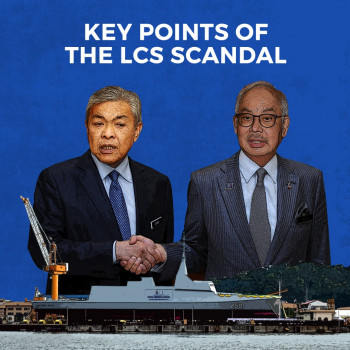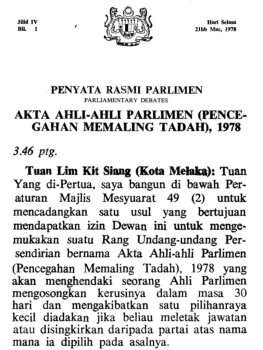Penang Chief Minister Lim Guan Eng announced the Penang State Budget 2012 under close watch as the nation looks to the island state’s success story for fiscal inspiration under the shadow of a looming economic downturn.
For two years in a row, the Auditor General’s Report has recognized Penang as the best financially managed state. The state achieved three consecutive years of surplus since 2008, with RM88 million in 2008, RM77 million in 2009 and RM33 million in 2010. Lim has attributed this success to the CAT governance of Competency, Accountability and Transparency.
Penang also holds the distinction of being the only state or federal government in Malaysian history to be praised by Transparency International for its efforts in fighting corruption.
The state’s healthy savings accumulated from four years of prudent financial management are able to comfortably cover the deficit budget tabled with a focus to address inequality, aptly titled “Equitable Economic Agenda” or Agenda Ekonomi Saksama.
Building More Affordable Houses
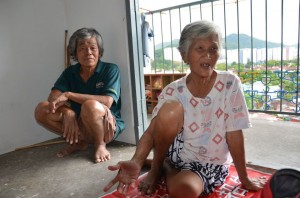
Penang State Exco member Wong Hon Wai together with the Penang Master Builders & Building Materials Dealers Association refurbished 170 units of unoccupied flats in Rifle Range. The units were then rented out to poor residents such as odd job worker Tang Saw Lean, 75 (inset photo) at RM90 a month.
National housing prices are soaring. From newlyweds to young adults, wage earners are struggling to afford their own homes in market conditions that are increasingly favoring developers. Rather than allowing the market conditions to dictate prices, some government intervention can address this social issue.
The Penang state government is allocating RM500 million to build 11,800 houses involving 200 acres in Batu Kawan under the first phase of its affordable housing scheme implemented by Penang Development Corporation.
In the second phase of the Affordable Homes Scheme, the state government with the cooperation of local councils MPPP and MPSP will provide 49 acres of land in four districts to build and additional 6,000 units of affordable homes. 29 acres are provided in Northern Seberang Perai, three acres in Central Seberang Perai, 11 acres in North East Penang, and six acres in South West Penang.
Apart from this, the state is also building People’s Housing Project (Projek Perumahan Rakyat), where the state-owned housing project charges tenants only RM100 for rental fees, inclusive of maintenance cost. To date, 433 PPR units in Desa Wawasan, Sungai Rambai and Bukit Mertajam have been rented out, while there are an additional 479 units available.
The state government has interviewed 39 applicants and 17 have been successfully offered PPR tenancy. RM195,000 has been allocated for upgrading works and to install grills for 30 houses.
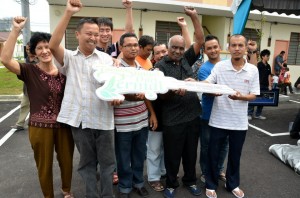
Happy house owners of Taman Sungai Duri Permai receiving their keys to affordable homes costing less than RM90,000.
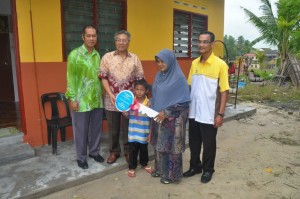
Penang Deputy Chief Minister I Mansor Othman handing over keys to state owned affordable homes in Seberang Perai Utama
Eradicating Poverty Statewide by 2013
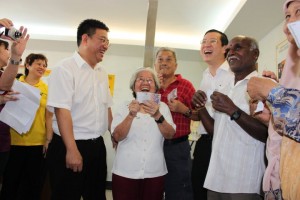 The Chief Minister also announced that Penang is bringing forward its target to eradicate poverty from 2015 to 2013. The plan to expedite the poverty elimination agenda is supported by the state’s good financial performance in the past two years. While economic growth is laudable, equitable distribution is also important to ensure the gap between the rich and the poor does not widen.
The Chief Minister also announced that Penang is bringing forward its target to eradicate poverty from 2015 to 2013. The plan to expedite the poverty elimination agenda is supported by the state’s good financial performance in the past two years. While economic growth is laudable, equitable distribution is also important to ensure the gap between the rich and the poor does not widen.
Under the Equitable Economic Agenda (AES), Penang plans to raise the median income for all households in the state to RM770. Currently, the Poverty Line Income benchmark for Peninsular Malaysia is RM763.
The Penang State Government has pledged to “top up” the income of all households who earn less than RM770 per month. For example, if a family receives only RM500 after all financial assistance, this family will receive RM 270 monthly to top up to RM 770 per month.
RM20 million has been allocated for this historic poverty elimination exercise that will commence in 2013. With this, Penang hopes to end state-wide poverty by the end of 2013.
In 2009, Penang was the first state in Malaysia to have wiped out hardcore poverty (households earning below RM400 a month). A feat which the state targets to repeat with the new AES budget.
Budget Highlights
Other key thrusts in Penang’s 2013 ‘AES’ Budget include:
- RM363.39 million for development projects to spur economic growth
- Creation of a 129,481 sq ft SME Centre in Bayan Lepas and SME village in Batu Kawan to stimulate investment and industrial development especially among Small and Medium Enterprises
- RM8.27 million for cultural and tourism activities to bolster Penang’s position as an arts, culture and tourism regional hub
- RM41.6 million allocation to upgrade and maintain state roads
- Reducing traffic congestion by offering the free BEST shuttle bus by Rapid Penang
- RM50 million for Housing Assistance Programme of Penang, Yes! (HAPPY!) to repair, upgrade and renovate low and medium cost flats in the state
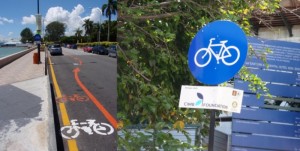
Cyclists can enjoy the new 12.5km coastal bicycle lane from Queensbay to Komtar, with more lanes to follow
Crony Economy vs People’s needs
BN also has its own “AES”. Instead of “Agenda Ekonomi Saksama”, it stands for Automated Enforcement System. The newly introduced and widely unpopular traffic management system has been accused of punishing the rakyat solely to enrich private companies. Clearly, BN has different policy approach towards economic development – practicing “crony economy” instead of prioritizing people’s needs.
On the one hand BN installs 1Malaysia cameras without any open competitive tender that benefits certain crony companies through commissions for every traffic summons issued, whilst PR Penang’s AES will allow Penang to be the first state in Malaysia to be free from poverty-in-record by 2013 by benefiting 2,000 poor families, including the Indian poor.
Which would you prefer?


